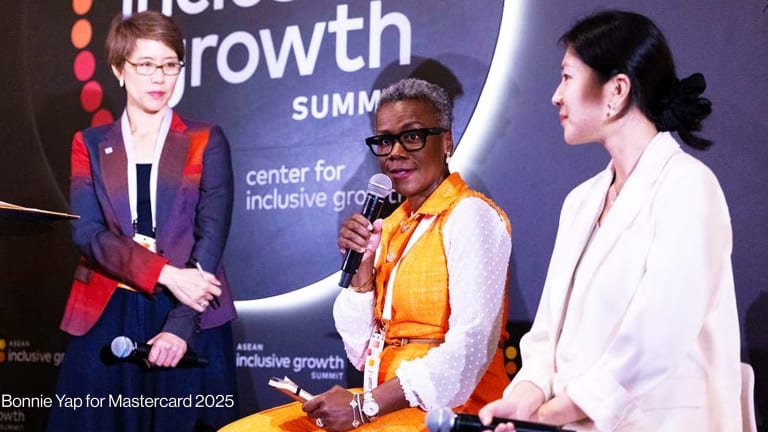
Artificial intelligence is propelling a new technological revolution.
Worldwide, there is a near-universal understanding of the potential of data and AI to reimagine what is possible and drive impact across sectors and domains.
Universal understanding — but not universal access.
In fact, in the social sector, where the challenges being addressed are increasingly complex, you are more likely to find organizations that are still in the early stages of their data and AI maturity journey. As our Data and AI Maturity Assessment has reinforced over the past three years, social impact historically lags behind the private sector in data and AI talent, tools, and tech.
But what happens when change agents committed to social issues such as financial inclusion, climate resilience, and public health are leading this new technological revolution?
Issuing a challenge
In 2020, data.org launched our first global call for innovation: the Inclusive Growth and Recovery Challenge. In partnership with the Mastercard Center for Inclusive Growth and The Rockefeller Foundation, we theorized that there were social impact leaders around the world with big ideas and even bolder strategies who, with some direction and support, could help people and communities thrive.
Our theory was spot on.
Five years and four challenges later, these engines of discovery have attracted more than 2,400 applications across 150 countries. Each application offers untold potential, and each has given us a greater understanding of the kind of technical support and workforce development pipelines that social sector organizations need to effectively leverage data and AI for impact.
We’ve learned that funding alone isn’t enough. To be successful, the sector needs technical assistance, mentorship, and opportunities to collaborate. They need a robust community of practice, which they can now find at data.org, underpinned by a network of reviewers and judges, peers and past winners, funders and partners who are all fiercely committed to applying data and AI to real-world problems.
With each challenge, we refine our approach and the resources we continue to develop for this growing community. And with each challenge, we’ve learned important lessons about how AI is shaping social impact:
1. Responsible AI requires an organizational culture shift. Challenge participants who are best positioned to use AI for social impact are committed to continual learning, cross-organization collaboration, and accountability to mitigate risks and appropriately align AI usage to the mission. They demonstrate humility and an understanding that there will always be some degree of bias in any dataset and that not every problem needs an AI solution. In our interviews, we often ask, “Have you considered alternatives, and is AI the best way to do this?” Struggling to answer this is a red flag.
2. The possibilities are there, but capacity is not evenly distributed. There are pockets of innovation happening around the world, and the latest generation of low- and no-code AI tools has made it easier than ever to experiment with AI. However, many organizations are still early on in their data and AI maturity journey. They are AI aware and experimenting, but still require organizational upskilling and data-literate talent to capture the value of AI. Without intentional efforts to build a skilled, purpose-driven workforce and organizational capacity, the gap between early adopters and those still laying the groundwork will widen.
3. There’s an opportunity to learn how the global majority wants AI to work for them. Our awardees are proof of the enormous upside of community-driven and culturally adaptive AI. It’s why we lead with localism at data.org. Our challenge experiences drive us to advocate for locally led innovation hubs — including our five Capacity Accelerator Networks across four continents. Awardees consistently remind us of the importance of developing solutions with, not just for, end users, and they reinforce the need for a shared ecosystem of tools and resources to advance inclusive AI.

From the Inclusive Growth and Recovery Challenge to the Artificial Intelligence to Accelerate Inclusion, or AI2AI, Challenge, we have spotlighted small organizations with big ideas, as well as established organizations with a hunger to experiment with data and AI in new ways.
That important work continues. Last month, we launched our latest challenge — the Activate AI: Economic Opportunity Challenge — alongside our partners at Zoom. Applications are open through early 2026, at which time we expect to source and scale transformative work while welcoming a new cohort of purpose-driven problem solvers into our community.
If past experience is any indication, the challenge process will be catalytic for us and for them, identifying leaders who deeply understand their communities and have novel ideas for how to improve them.
Novel ideas with the power to improve lives around the world.
So, as data.org gears up for another exciting challenge, and as we look ahead to the next five years of democratizing data and AI for good, we will continue to listen to, lean on, and learn from these leaders in the field about what they need and how we can help.
It’s our mission — and our smartest strategy to accelerate impact.
Apply to the Activate AI: Economic Opportunity Challenge, data.org’s new global initiative with Zoom, by Jan. 8, 2026. Click here to learn more.








